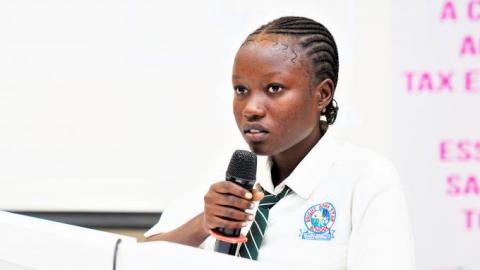School girls call for tax exemption on sanitary products so that they can afford them.

Mirfat, 18, of Bright Boma Secondary School, reported on the challenges facing young girls in regard to menstrual health management on the International Day of Menstrual Hygiene Management in Juba. Photo: Estella John/SSave the Children
JUBA, SOUTH SUDAN, May 30th This month, Save the Children joined partners to commemorate International Menstrual Hygiene Day in Juba. Over 120 people from various institutions, including students from Bright Boma Primary and Secondary School, teachers, members of parliament, representatives from civil society organisations, UN agencies, the Dutch Embassy, and representatives from the community, came together to raise awareness about the importance of menstrual hygiene management.
This year’s event was celebrated under the theme: Period-Friendly South Sudan. At the event, the Menstrual Health Management National Guidelines for South Sudan was also launched. The guideline was developed by the Ministry of General Education and Instruction with the support of Save the Children, UNFPA, and various organisations under the umbrella of the South Sudan Coalition for Menstrual Hygiene Management.
During the event organised by the Ministry of General Education and Instruction (MoGEI), school-going girls called on the government to remove taxes on sanitary products so that girls can afford them. Girls at the event also call on schools to have a period-friendly environment for the girls to change in privacy with dignity and pride to enable them to have better academic performance and good health, which will boost their self-esteem and confidence.
“Many young girls miss school, and many express fears of achieving their dreams should the high price of sanitary products for menstruation continue to be high," said, Mirfat Roman, 18, a representative of students talking on behalf of many young girls in South Sudan who face the challenge of the high cost of sanitary pads,
“It is possible to exempt taxes on sanitary pads; we in the Parliament are here to speak on what the citizens are facing; menstruation is a serious matter, and the women and girls are facing challenges. I will take this discussion to the national parliament, and we should find a solution to this," said Hon. Nyayang Johnson Lok, the Chairperson for the Standing Specialised Committee on Gender, Child, Social Welfare, and Religious Affairs in the South Sudan Revitalised Transitional National Legislative Assembly.
The International Day of Menstrual Hygiene is an annual global celebration aimed at raising awareness about the importance of menstrual hygiene management and the impact it has on education, health, and overall quality of life.
The lack of menstrual hygiene management kits for adolescent girls is one of the factors leading to regular absenteeism among girls. The Multi-Year Resilience Program (MYRP), led by Save the Children in partnership with Norwegian Refugee Council, Finn Church Aid, and the Ministry of General Education and Instruction (MoGEI), and funded by Education Cannot Wait (ECW) supports girls with menstrual hygiene management kits and train them on how best they can manage themselves, including menstrual cramps.
Written by Estella John / Save the Children
Edited by Tito Justin / Save the Children
 South Sudan
South Sudan